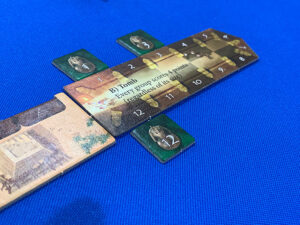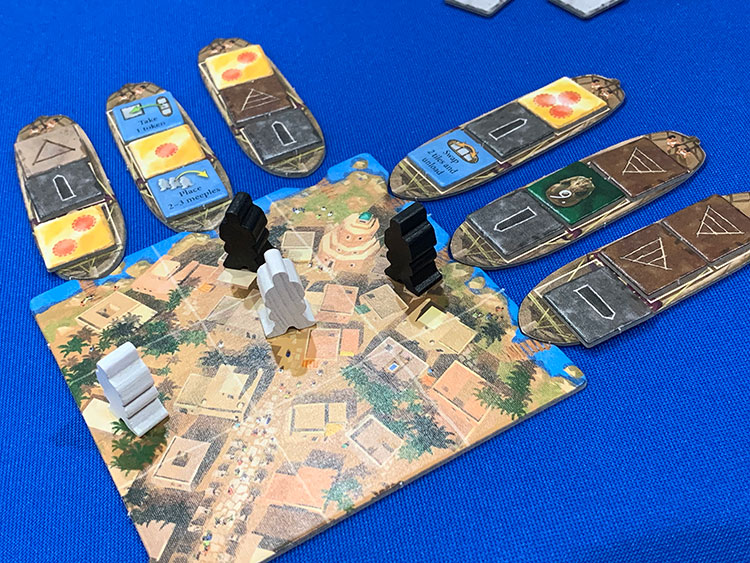 One of the pleasant evolutions of board games these days is the realignment in the way board game designers have looked at different player counts. At one time games expected 3 or more players were common, but given the wide variety of gaming situations, markets, and externalities, publishers have also seen the value in producing games that suit specific player counts. In particular, 2 player versions of games have also received special focus, bringing game experiences just different enough from their multiplayer counterparts.
One of the pleasant evolutions of board games these days is the realignment in the way board game designers have looked at different player counts. At one time games expected 3 or more players were common, but given the wide variety of gaming situations, markets, and externalities, publishers have also seen the value in producing games that suit specific player counts. In particular, 2 player versions of games have also received special focus, bringing game experiences just different enough from their multiplayer counterparts.
KOSMOS is no stranger here. They’ve produced a slew of 2 player games that have hit the market with success. And it makes sense for them to follow up the success of Imhotep, playable at 2 players but much more enjoyable with 3 or more, by producing a title that is more compact and targeted specifically for a gaming pair. Add to that it takes only 30 minutes, and they’ve set Imhotep: The Duel up for success as a filler as well.
Gameplay Overview:
The “duel” nature of Imhotep ostensibly occurs between Nefertiti and Akhenaten constructing pyramids, tombs, obelisks, and temples. Each structure gains points from an accumulation of tokens (not blocks as in the larger game) in various patterns depending on the game setup. The tokens come from the unloading of boats depending on the placement of meeples.

The way it all works is based on a 3×3 grid similar to tic-tac-toe. Players each take turns to do one of the following:
- Place a Meeple
- Unload a Boat
- Play a Blue Action Token
When placing a meeple, the player chooses a location on the 3×3 board and places one of their pawns.
When a row or column has at least 2 pawns in it, a player can choose to unload a boat aligned to those pawns. The pawn closest to the boat, which could be in either of 2 positions, grants the owner the token on the boat furthest from the dock. The next pawn grants the owner the next token, and so on.

Finally, some of the tokens (blue colored) from the boats provide special actions. If a player has acquired one of these, they can spend a turn to use it. These generally allow players to take tokens off boats, move tokens between boats, or place an extra meeple on a turn.
The scoring is where some of the real strategy is focused. Each of the tokens gathered from boats is aligned to one of the 4 scoring zones. Obelisk token scoring is 1 pt/token and a 6 pt bonus to the player with the most tokens. Temple tokens score for sets with 1, 2, 3, and 4 sun disks. The pyramid tokens score higher based on the number of tokens the player has. Finally, the tomb scores based on how different tokens are grouped. And of course, each of these scoring methods is dependent on whether players agree to use the A or B side of the scoring boards.

Game Experience:
Two-player games work best when the overall flow and tone feels like a cold war. That may seem a weird position to take, but considering that elevating tension between players drives the drama of the experience, capturing this tone of an “almost direct conflict” is essential. Imhotep: The Duel sits comfortably in this zone and never gets out of it. It’s a rare game that can achieve this.

What’s more amazing to this reviewer is that the game is so simple. Much like a good game of chess, Imhotep: The Duel requires only that players place pawns on a 3×3 grid and look for combinations and opportunities, all the while staving off interjections of the opposing player’s agenda. The choices each turn are intriguing and help a player fuel their strategy (which point set to aim for) in the game overall.
There are faults in the mix, but not major ones. The first comes from the game variability. Even though there are two sides to each scoring board providing a good variety of options, they just don’t feel different enough. For most situations, it’s just a matter of choosing one token or another fueling whatever scoring is required. It’s interesting but feels samey. If players have a large collection of two-player games and don’t revisit Imhotep: The Duel so often, it’s an easy issue to ignore.
Final Thoughts:
Imhotep: The Duel is a solid two-player game. It has the right tone of push and pull that feels like a thrust-parry-thrust sword fight over tokens for points. Players who love the kind of tension that comes from good two-player abstract games like chess will find exactly the same conflict here. With such a simple set of components and scoring rules, designer Phil Walker-Harding has definitely managed to adapt the same tension that makes a larger game great for a smaller scale. Just don’t play Imhotep: The Duel too often to make sure that magic is preserved.
Final Score: 4 Stars -– A great two-player experience if played infrequently.
 Hits:
Hits:
• Challenging options on a tactical and strategic level
• Simple and easy to learn
• Good options for variability
Misses:
• Can get samey if played frequently























Great review! We have Imhotep already and I was wondering what the Duel version was like. It looks very interesting, though I will be honest. Tokens instead of more tangible blocks would be a letdown for me. And with limited space, I would want something my husband and I would be able to play frequently and still enjoy. Thank you so much for taking the time to write this reveiw!
Thanks Juliet. Even though it is tokens instead of blocks, it does feel like Imhotep. Cheers!